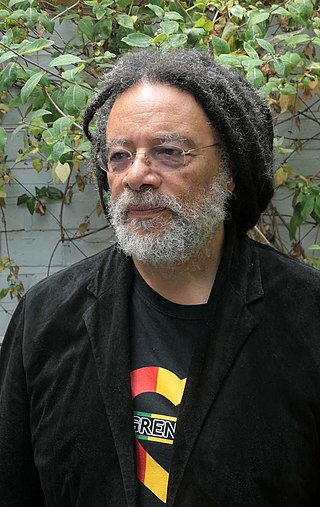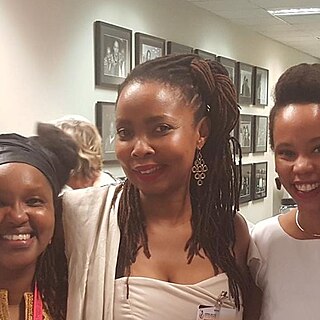Related Research Articles

The University of the Witwatersrand, Johannesburg, commonly known as Wits University or Wits, is a multi-campus public research university situated in the northern areas of central Johannesburg, South Africa. The university has its roots in the mining industry, as do Johannesburg and the Witwatersrand in general. Founded in 1896 as the South African School of Mines in Kimberley, it is the third oldest South African university in continuous operation.

Paul Gilroy is an English sociologist and cultural studies scholar who is the founding Director of the Sarah Parker Remond Centre for the Study of Race and Racism at University College London (UCL). Gilroy is the 2019 winner of the €660,000 Holberg Prize, for "his outstanding contributions to a number of academic fields, including cultural studies, critical race studies, sociology, history, anthropology and African-American studies".

Country of My Skull is a 1998 nonfiction book by Antjie Krog about the South African Truth and Reconciliation Commission (TRC). It is based on Krog's experience as a radio reporter, covering the Commission from 1996 to 1998 for the South African Broadcasting Corporation. The book explores the successes and failures of the Commission, the effects of the proceedings on her personally, and the possibility of genuine reconciliation in post-Apartheid South Africa.

Joseph-Achille Mbembe, known as Achille Mbembe, is a Cameroonian historian, political theorist, and public intellectual who is a research professor in history and politics at the Wits Institute for Social and Economy Research at the University of the Witwatersrand. He is well known for his writings on colonialism and its consequences and is a leading figure in new wave French critical theory.

Adam Mahomed Habib is a South African academic administrator serving as Director of the School of Oriental and African Studies, University of London since 1 January 2021. He served as Vice-Chancellor and Principal of the University of the Witwatersrand (Wits) in Johannesburg, South Africa, between 1 June 2013, when the term of his predecessor Loyiso Nongxa ended, and 1 January 2021. He is also a former deputy vice-chancellor of the University of Johannesburg.
Makhosazana Xaba is a South African poet and short-story writer. She trained as a nurse and has worked a women's health specialist in NGOs, as well as writing on gender and health. She is Associate Professor of Practice in the Faculty of Humanities at the University of Johannesburg.

The Wits Vuvuzela is the student newspaper of the University of the Witwatersrand (Wits) in South Africa. The newspaper is produced by the students of the Wits Department of Journalism, and appears in both printed and online formats. The print version has a circulation of 10,000 bi-monthly while the online newspaper attracts between 40-60,000 unique views per month.
Françoise Lionnet serves as acting chair of the Committee on Degrees in Studies of Women, Gender and Sexuality at Harvard University, where she is professor of Romance languages and literatures, comparative literature, and African and African American studies. She is distinguished research professor of comparative literature and French and Francophone studies at UCLA, and a research associate of the Centre for Indian Studies in Africa at the University of Witwatersrand, Johannesburg. She served as director of the African Studies Center and Program Co-Director of UCLA's Mellon Postdoctoral Fellowship in the Humanities: Cultures in Transnational Perspective.
The McKenzie Lectures are a series of annual public lectures delivered by "a distinguished scholar on the history of the book, scholarly editing, or bibliography and the sociology of texts". The lectures are held in Oxford at the Centre for the Study of the Book. The series was inaugurated in 1996, in honour of Donald Francis McKenzie (1931–1999), upon his retirement as Professor of Bibliography and Textual Criticism, University of Oxford.
Dame Karin Judith Barber, is a British cultural anthropologist and academic, who specialises in the Yoruba-speaking area of Nigeria. From 1999 to 2017, she was Professor of African Cultural Anthropology at the University of Birmingham. Before joining the Centre of West African Studies of the University of Birmingham, she was a lecturer at the University of Ife in Nigeria. Since 2018, she has been Centennial Professor of Anthropology at the London School of Economics.
Francesca Orsini, FBA is an Italian scholar of South Asian literature. She is currently Professor of Hindi and South Asian Literature at the School of Oriental and African Studies (SOAS), University of London. She previously lectured at the University of Cambridge, before joining SOAS in 2006. For the 2013/2014 academic year, she was Mary I. Bunting Institute Fellow at the Radcliffe Institute for Advanced Study, Harvard University.

Tawana Kupe is a Zimbabwean academic. He was the vice-chancellor of the University of Pretoria in South Africa. Prior to this appointment he held several senior positions at the University of Witwatersrand, including deputy vice-chancellor and vice-principal, where he also founded the Media Studies Department. He also lectured at Rhodes University. Before Rhodes, he worked in various academic capacities at the University of Zimbabwe.
Philip Lewis Bonner was a historian of South Africa. He was an Emeritus Professor at the University of the Witwatersrand with a focus on labour and urban history.
Sarojini Nadar is a South African theologian and biblical scholar who is the Desmond Tutu Research Chair in Religion and Social Justice at the University of the Western Cape.
Bhekizizwe Peterson was a prominent African intellectual born in Alexandra Township in Johannesburg, South Africa. Until his passing, he was a Professor of African Literature at University of the Witwatersrand. Peterson was also an internationally renowned film writer and producer. He co-founded Natives at Large, a black owned and controlled South African full service Film & Television production company. He co - founded Natives at Large with film-maker Ramadan Suleman.

Pumla Dineo Gqola is a South African academic, writer, and gender activist, best known for her 2015 book Rape: A South African Nightmare, which won the 2016 Alan Paton Award. She is a professor of literature at Nelson Mandela University, where she holds the South African Research Chair in African Feminist Imaginations.
Deborah Posel is a South African sociologist who is professor emeritus at the University of Cape Town (UCT). She was the founding director of two prominent interdisciplinary research institutes, UCT's Institute for Humanities in Africa and the Wits Institute for Social and Economic Research. Her academic interests are primarily in the historical sociology of apartheid and the sociology of post-apartheid South Africa.
Sarah Nuttall is a South African academic and cultural critic who is professor of literary and cultural studies at the University of the Witwatersrand. She was director of the Wits Institute for Social and Economic Research from 2013 to 2022. She has published widely about post-apartheid South Africa, including on topics in literary theory, cultural theory, urban theory, and aesthetics.
Catherine Hester Albertyn is a South African academic who is a professor of law at the University of the Witwatersrand, where she holds the South African Research Chair in Equality, Law and Social Justice. Known for her work in constitutional law, she has been a professor at the university since 2001 and formerly ran its Centre for Applied Legal Studies between 2001 and 2007. She has also served as a commissioner at the Commission for Gender Equality and the South African Law Reform Commission.
References
- 1 2 3 4 Ranganathan, Murali (1 April 2021). "Print History: Isabel Hofmeyr – The View from Africa". PrintWeek. Retrieved 2023-11-14.
- 1 2 3 4 5 6 7 8 9 "Curriculum Vitae: Isabel Hofmeyr". Academia.edu. Retrieved 2023-11-14.
- ↑ "Isabel Hofmeyr". Wits Institute for Social and Economic Research. Retrieved 2023-11-14.
- 1 2 3 "Professor Isabel Hofmeyr". The Mail & Guardian. 2015-08-28. Retrieved 2023-11-14.
- ↑ Bower, Colin (2006-03-03). "New claims against Krog". The Mail & Guardian. Retrieved 2023-11-14.
- ↑ "Wits scholars and publisher win humanities and social sciences awards". Wits University. 25 April 2023. Retrieved 2023-11-14.
- ↑ "Academy of Science SA elects Wits researchers for their scholarship and social impact". Wits University. 16 October 2017. Retrieved 2023-11-14.